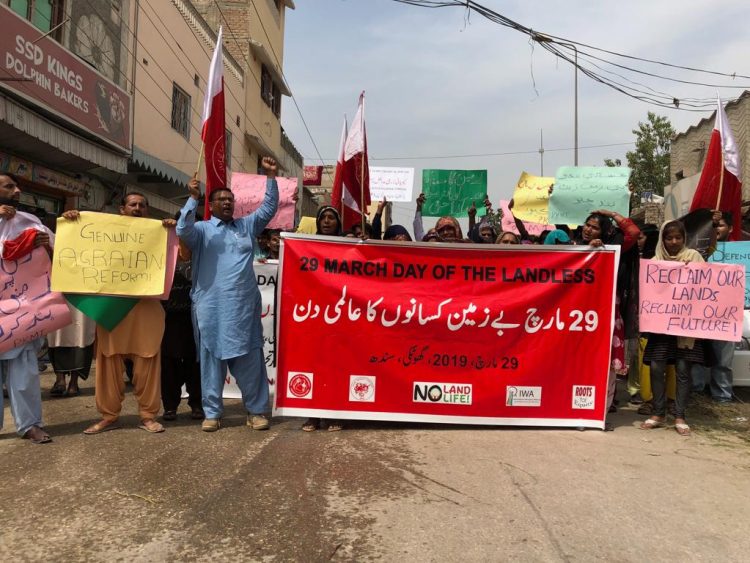In a strong show of support to rural communities asserting their right to land, 139 global, regional and national organizations from 26 countries across Asia Pacific, Africa, Latin America, North America and Europe issued a joint statement1 to mark the Day of the Landless last 29 March.
Several solidarity actions were also held on the same day.
“We (also) face the world today with even greater resolve and determination to reclaim our lands and future. We witness how movements of oppressed and exploited rural peoples in various countries push back against the onslaught of land and resource grabbing despite of and amid the systematic killings, persecution and harassment of their ranks,” part of the statement read.
The joint statement was prepared by the Asian Peasant Coalition (APC), PAN Asia Pacific (PANAP) and the People’s Coalition on Food Sovereignty (PCFS) and was endorsed by 17 other global and regional networks as well as by 119 national and local organizations.
Citing recent studies, the groups noted that small holder farms comprise more than 83% of the total number of farms yet only operate about 12% of the world’s agricultural land. Landlessness push rural communities into poverty as they comprise 80% of the poor worldwide.
First held in 2015, the Day of the Landless marks the founding anniversary of the APC and the launching of the anti-land grabbing campaign “No Land, No Life!”.
Solidarity actions
In the district of Ghotki in Sindh, Pakistan, members of the Pakistan Kissan Mazdoor Tehreek (PKMT), an organization of small and landless farmers, held a public convention and a rally. Chanting “No land, no life!”, the farmers reiterated the peasant demand of land to the tiller.
“Corporate agriculture practices are ruthlessly evicting the small and landless farmers from their lands. (The) use of chemical inputs are destroying our lands while drowning us in debt. The landless farmers are being forced to migrate from their lands to urban areas and face further exploitation,” said PKMT national coordinator Raja Mujeeb at the convention. He is also the current secretary general of the APC.
In Indonesia, the 250,000-strong peasant group Aliansi Gerakan Reforma Agraria (AGRA) – along with the Front Perjuangan Rakyat (FPR) and International League of Peoples’ Struggle (ILPS) Indonesia – organized coordinated actions in the country’s 18 provinces.
“Like the peasants, indigenous people and rural communities in developing countries in Asia, Latin America and Africa, the peasants and people of Indonesia also experience the same problems of poverty and hunger… that have been caused by massive land grabbing,” said AGRA chairperson Rahmat Ajiguna at a rally in Donggala District in Central Sulawesi. Ajiguna is also the APC’s vice chairperson for internal affairs.

In Dhaka, various groups led by the peasant group Bangladesh Krishok Federation (BKF) and its allies held a public rally. They highlighted the people’s legitimate right to land and livelihood, including on khas (state) agricultural lands in the country.
“The human rights of peasants should be promoted, including the food sovereignty of the people… The landless people should be empowered through a comprehensive and genuine land and agrarian reform. With this, rural poverty and hunger are possible to remove,” said Badrul Alam, president of the BKF.

Meanwhile, led by the Asia Pacific Research Network (APRN), civil society groups and people’s organizations from Hongkong, India, Indonesia, Malaysia, Pakistan, the Philippines and Thailand among others held a silent protest at the United Nations’ (UN) 6th Asia Pacific Forum on Sustainable Development (APFSD) in Bangkok.

Speaking at one of the UN meeting’s side events, Triana Kurnia Wardani of the women’s group Serikat Perempuan Indonesia (SERUNI) said that women who participate in the defense of lands and rights are subjected to threats, harassment and intimidation. “Having to experience grave injustice in dire living and working conditions, women in agriculture have seen the vital importance of collective action,” said Wardani.
Resistance amid repression
Indeed, collective action remains the rural peoples’ best hope to stop and reverse land grabbing and to assert their collective rights to development and self-determination, PCFS pointed out.
“Food sovereignty is in action through land occupation and collective cultivation campaigns taking place in many countries,” PCFS global co-chairperson Sylvia Mallari said.
For APC chairperson Chennaiah Poguri of the Andhra Pradesh Vyavsaya Vruthidarula Union (APVVU), a federation of informal rural workers and artisans, sharecroppers and marginal farmers in India, repression will never dampen the peasants’ commitment to fight for land and rights.
“Genuine development can only be achieved through land distribution to the communities and genuine agrarian reform,” Poguri stressed.
For its part, PANAP expressed appreciation for the overwhelming display of solidarity that this year’s Day of the Landless received.
“It has always been our objective to gather this kind of broad support for the struggle of the landless and of the rural communities when we launched the No Land, No Life! campaign with the APC,” said Sarojeni Rengam, PANAP executive director.
Rengam added that such show of international support is crucial amid the increasingly repressive environment that faces rural communities resisting land grabbing. ###
_______________________________
1 When the statement was first released on 29 March, the number of endorsing organizations was 126 from 24 countries. It has since been adjusted to 139 groups from 26 countries to include other organizations that expressed their endorsement after the statement was publicly released.








Discussion about this post